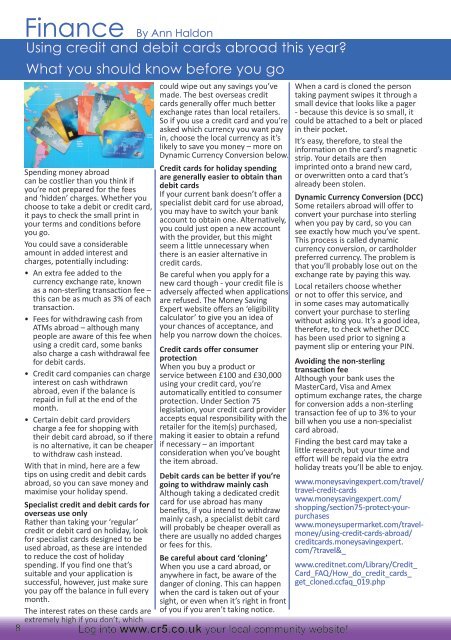CR5 Issue 147 August 2017
A free community magazine for the CR5 Postcode containing local business advertising, interesting reads, What's On in the area and puzzles
A free community magazine for the CR5 Postcode containing local business advertising, interesting reads, What's On in the area and puzzles
You also want an ePaper? Increase the reach of your titles
YUMPU automatically turns print PDFs into web optimized ePapers that Google loves.
Finance By Ann Haldon<br />
Using credit and debit cards abroad this year?<br />
What you should know before you go<br />
Spending money abroad<br />
can be costlier than you think if<br />
you’re not prepared for the fees<br />
and ‘hidden’ charges. Whether you<br />
choose to take a debit or credit card,<br />
it pays to check the small print in<br />
your terms and conditions before<br />
you go.<br />
You could save a considerable<br />
amount in added interest and<br />
charges, potentially including:<br />
• An extra fee added to the<br />
currency exchange rate, known<br />
as a non-sterling transaction fee –<br />
this can be as much as 3% of each<br />
transaction.<br />
• Fees for withdrawing cash from<br />
ATMs abroad – although many<br />
people are aware of this fee when<br />
using a credit card, some banks<br />
also charge a cash withdrawal fee<br />
for debit cards.<br />
• Credit card companies can charge<br />
interest on cash withdrawn<br />
abroad, even if the balance is<br />
repaid in full at the end of the<br />
month.<br />
• Certain debit card providers<br />
charge a fee for shopping with<br />
their debit card abroad, so if there<br />
is no alternative, it can be cheaper<br />
to withdraw cash instead.<br />
With that in mind, here are a few<br />
tips on using credit and debit cards<br />
abroad, so you can save money and<br />
maximise your holiday spend.<br />
Specialist credit and debit cards for<br />
overseas use only<br />
Rather than taking your ‘regular’<br />
credit or debit card on holiday, look<br />
for specialist cards designed to be<br />
used abroad, as these are intended<br />
to reduce the cost of holiday<br />
spending. If you find one that’s<br />
suitable and your application is<br />
successful, however, just make sure<br />
you pay off the balance in full every<br />
month.<br />
The interest rates on these cards are<br />
extremely high if you don’t, which<br />
could wipe out any savings you’ve<br />
made. The best overseas credit<br />
cards generally offer much better<br />
exchange rates than local retailers.<br />
So if you use a credit card and you’re<br />
asked which currency you want pay<br />
in, choose the local currency as it’s<br />
likely to save you money – more on<br />
Dynamic Currency Conversion below.<br />
Credit cards for holiday spending<br />
are generally easier to obtain than<br />
debit cards<br />
If your current bank doesn’t offer a<br />
specialist debit card for use abroad,<br />
you may have to switch your bank<br />
account to obtain one. Alternatively,<br />
you could just open a new account<br />
with the provider, but this might<br />
seem a little unnecessary when<br />
there is an easier alternative in<br />
credit cards.<br />
Be careful when you apply for a<br />
new card though - your credit file is<br />
adversely affected when applications<br />
are refused. The Money Saving<br />
Expert website offers an ‘eligibility<br />
calculator’ to give you an idea of<br />
your chances of acceptance, and<br />
help you narrow down the choices.<br />
Credit cards offer consumer<br />
protection<br />
When you buy a product or<br />
service between £100 and £30,000<br />
using your credit card, you’re<br />
automatically entitled to consumer<br />
protection. Under Section 75<br />
legislation, your credit card provider<br />
accepts equal responsibility with the<br />
retailer for the item(s) purchased,<br />
making it easier to obtain a refund<br />
if necessary – an important<br />
consideration when you’ve bought<br />
the item abroad.<br />
Debit cards can be better if you’re<br />
going to withdraw mainly cash<br />
Although taking a dedicated credit<br />
card for use abroad has many<br />
benefits, if you intend to withdraw<br />
mainly cash, a specialist debit card<br />
will probably be cheaper overall as<br />
there are usually no added charges<br />
or fees for this.<br />
Be careful about card ‘cloning’<br />
When you use a card abroad, or<br />
anywhere in fact, be aware of the<br />
danger of cloning. This can happen<br />
when the card is taken out of your<br />
sight, or even when it’s right in front<br />
of you if you aren’t taking notice.<br />
8 Log into www.cr5.co.uk your local community website!<br />
When a card is cloned the person<br />
taking payment swipes it through a<br />
small device that looks like a pager<br />
- because this device is so small, it<br />
could be attached to a belt or placed<br />
in their pocket.<br />
It’s easy, therefore, to steal the<br />
information on the card’s magnetic<br />
strip. Your details are then<br />
imprinted onto a brand new card,<br />
or overwritten onto a card that’s<br />
already been stolen.<br />
Dynamic Currency Conversion (DCC)<br />
Some retailers abroad will offer to<br />
convert your purchase into sterling<br />
when you pay by card, so you can<br />
see exactly how much you’ve spent.<br />
This process is called dynamic<br />
currency conversion, or cardholder<br />
preferred currency. The problem is<br />
that you’ll probably lose out on the<br />
exchange rate by paying this way.<br />
Local retailers choose whether<br />
or not to offer this service, and<br />
in some cases may automatically<br />
convert your purchase to sterling<br />
without asking you. It’s a good idea,<br />
therefore, to check whether DCC<br />
has been used prior to signing a<br />
payment slip or entering your PIN.<br />
Avoiding the non-sterling<br />
transaction fee<br />
Although your bank uses the<br />
MasterCard, Visa and Amex<br />
optimum exchange rates, the charge<br />
for conversion adds a non-sterling<br />
transaction fee of up to 3% to your<br />
bill when you use a non-specialist<br />
card abroad.<br />
Finding the best card may take a<br />
little research, but your time and<br />
effort will be repaid via the extra<br />
holiday treats you’ll be able to enjoy.<br />
www.moneysavingexpert.com/travel/<br />
travel-credit-cards<br />
www.moneysavingexpert.com/<br />
shopping/section75-protect-yourpurchases<br />
www.moneysupermarket.com/travelmoney/using-credit-cards-abroad/<br />
creditcards.moneysavingexpert.<br />
com/?travel&_<br />
www.creditnet.com/Library/Credit_<br />
Card_FAQ/How_do_credit_cards_<br />
get_cloned.ccfaq_019.php

















